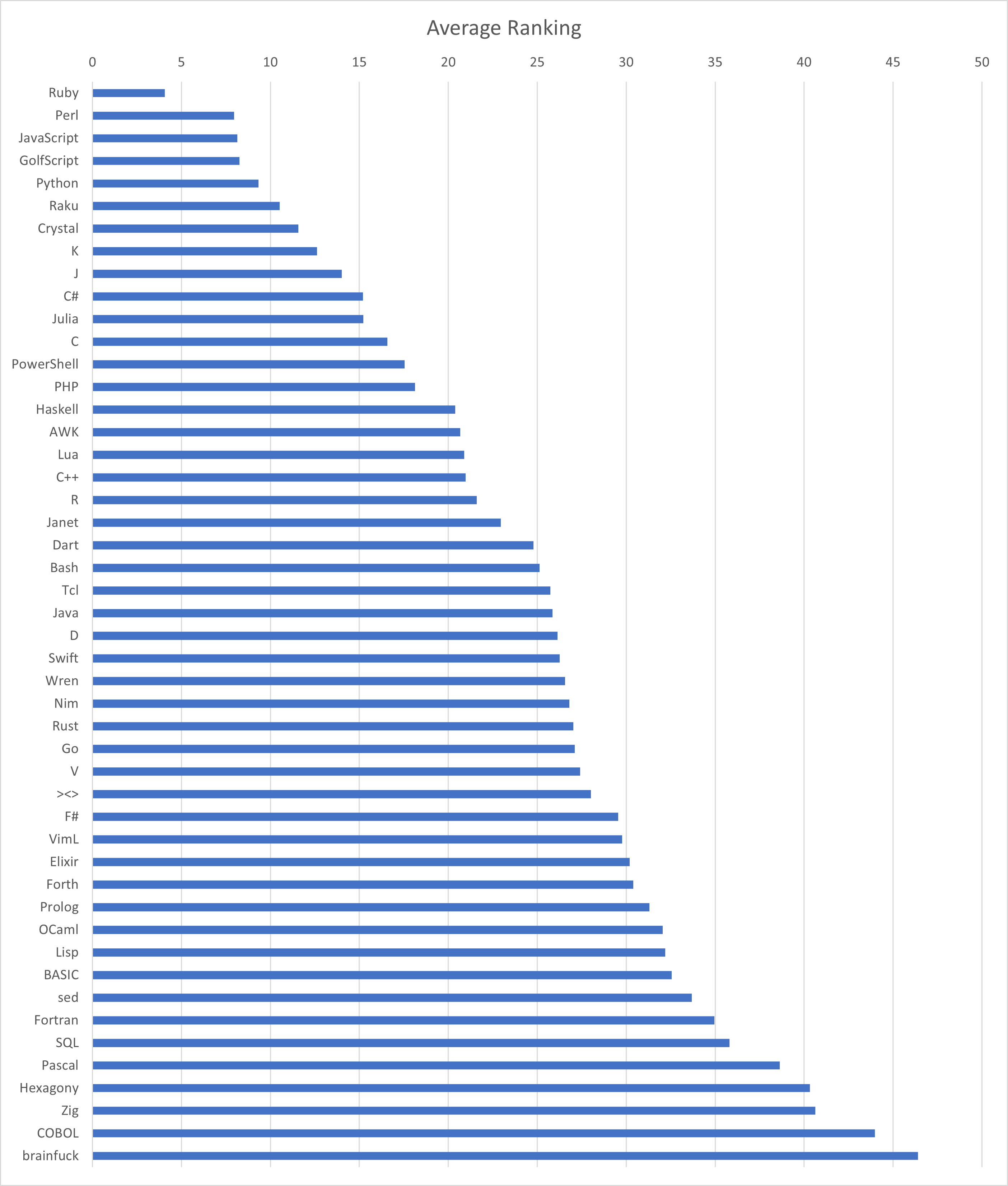I was looking at code.golf the other day and I wondered which languages were the least verbose, so I did a little data gathering.
I looked at 48 different languages that had completed 79 different code challenges on code.golf. I then gathered the results for each language and challenge. If a “golfer” had more than 1 submission to a challenge, I grabbed the most recent one. I then dropped the top 5% and bottom 5% to hopefully mitigate most outliers. Then came up with an average for each language, for each challenge. I then averaged the results across each language and that is what you see here.
For another perspective, I ranked each challenge then got the average ranking across all challenges. Below is the results of that.

Disclaimer: This is in no way scientific. It’s just for fun. If you know of a better way to sort these results please let me know.
I’d love to see the same comparison with more real-world use-cases.
Code golf, is mostly pretty simple use-cases, which have been optimized many times over.
When, you build out an application with a user-interface, proper event handling, etc… c++ is MUCH more verbose then c# for example, and they are ranked pretty close together.
Java placed way better than I expected
You can write concise Java. Just like you can write readable Haskell. It’s just not idiomatic to do so.
System.out.print("I agree.");Don’t you mean:
class AgreementManagerClass { public static void main(String[] args) { System.out.println("I agree."); } }
It is always dismissed as too verbose, while in go’s case it is never mentioned, when in fact the latter is way more verbose… People’s bias show.
Maybe also bias by the number / experience of people using it.
1st semester students getting shocked by
public static void main(String args)and meming it on the internet.Go on the other hand likely isn’t a common choice / option for a first language.
I’m really surprised to see Java ranked as less-verbose than OCaml.
Here’s an equivalent code sample in Java 17 vs OCaml:
Java:
abstract sealed class Expr permits Value, Add, Subtract, Multiply, Divide { abstract long eval(); } record Value(long value) extends Expr { @Override long eval() { return value; } } record Add(Expr left, Expr right) { @Override long eval() { return left.eval() + right.eval(); } } record Subtract(Expr left, Expr right) { @Override long eval() { return left.eval() - right.eval(); } } record Multiply(Expr left, Expr right) { @Override long eval() { return left.eval() * right.eval(); } } record Divide(Expr left, Expr right) { @Override long eval() { return left.eval() / right.eval(); } }OCaml:
type expr = | Value of int | Add of expr * expr | Subtract of expr * expr | Multiply of expr * expr | Divide of expr * expr let rec eval = function | Value value -> value | Add (left, right) -> (eval left) + (eval right) | Subtract (left, right) -> (eval left) - (eval right) | Multiply (left, right) -> (eval left) * (eval right) | Divide (left, right) -> (eval left) / (eval right)…Java has so much more syntactical overhead than OCaml, and that’s even with recent Java and being pretty aggressive about using boiler-plate reducing sugars like Records. And F# has even less, since it doesn’t require you to use different operators for numerics or do as much manual casting between strings/numerics
Why is sql so low?



